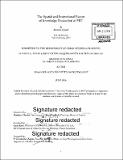The spatial and institutional factors of knowledge production at MIT
Author(s)
Claudel, Matthew (Matthew Christopher)
DownloadFull printable version (11.40Mb)
Other Contributors
Massachusetts Institute of Technology. Department of Urban Studies and Planning.
Advisor
Carlo Ratti and Fiona Murray.
Terms of use
Metadata
Show full item recordAbstract
Academic research is increasingly cross-disciplinary and collaborative - around the globe and within institutions. In this context, what is the role and relevance of the campus? I examine the scholarly output and collaboration patterns of the Massachusetts Institute of Technology as they pertain to its interrelated organizational structures, including institutional affiliation and spatial configuration, over a 10-year time span. There are four significant results: 1. diverging trends in the composition of collaborative teams over time (size, faculty versus non-faculty, etc.) between papers and patents; 2. patterns of cross-building and cross-disciplinary collaboration are substantively different between papers and patents; 3. a network topology and community structure that reveals spatial versus institutional collaboration trends; and 4. a persistent relationship between proximity and collaboration, well fit with an exponential decay model, that is consistent for papers, patents, and for specifically cross-disciplinary work. These insights contribute an architectural dimension to the field of scientometrics, taking a first step toward empirical foundations for applied institutional policy and spatial planning.
Description
Thesis: S.M., Massachusetts Institute of Technology, Department of Urban Studies and Planning, 2016. Cataloged from PDF version of thesis. Includes bibliographical references (pages 59-62).
Date issued
2016Department
Massachusetts Institute of Technology. Department of Urban Studies and PlanningPublisher
Massachusetts Institute of Technology
Keywords
Urban Studies and Planning.